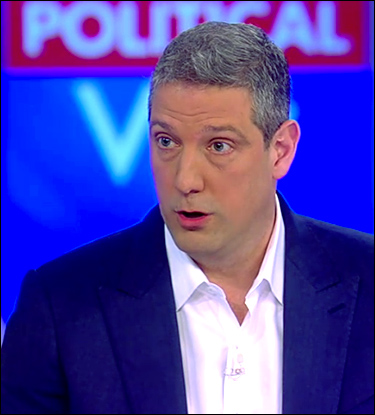By Jim Ellis

Ohio Rep. Tim Ryan announces his candidacy for the 2020 Presidential Election on the TV talk show, “The View.”
Rep. Ryan becomes the 17th official presidential candidate, but he will not necessarily be leaving the House if he loses his long shot national bid. Under Ohio election law, individuals may simultaneously run for more than one office and the congressman says he will also file for re-election.
More announcements are expected in April. As we have recently seen, it appears former Vice President Joe Biden will soon enter the race, as will at least one and possibly a second House member. California Rep. Eric Swalwell (D-Dublin/Hayward) will reportedly announce his presidential campaign next week, an effort he has been discussing for more than a year.
Swalwell is saying he won’t run for both offices as is Rep. Ryan, but he does leave himself a path to return to the House. Rep. Swalwell indicates that if his presidential effort isn’t proceeding as planned when the California candidate filing deadline approaches, he could end his national campaign and then file for re-election.
A third congressman, Rep. Seth Moulton of Massachusetts, is also close to making a decision about a presidential run. He has made repeated visits to neighboring New Hampshire and people close to the congressman have been suggesting for a couple of weeks that Moulton will soon announce his own presidential effort.
One individual whose plans may be on hold, however, is Sen. Michael Bennet (D-CO). Early in the year, Sen. Bennet indicated that he was considering making a presidential run but was then quiet until last week when he confirmed that he would soon announce.
Bennet revealed late last week, however, that he is dealing with prostate cancer and though his prognosis for recovery is bright, it is unclear whether the treatments will physically disqualify him from running during the 2020 nomination period. Sen. Bennet indicated that he still hopes to complete his medical protocol in time to launch and construct a viable national campaign.
Additionally, former Virginia governor and Democratic National Committee chairman, Terry McAuliffe, also reiterates that he is likely to enter the race in April, but less evidence of a structural campaign is apparent.
Like Rep. Moulton, Montana Gov. Steve Bullock has made multiple trips to an early presidential voting state. While indicating that he, too, will soon enter the campaign, Bullock has made several preparatory trips to Iowa in order to begin attracting support as a rural governor before a rural constituency.
If all of the aforementioned individuals enter the race, we will see 23 Democratic candidates beginning to compete for the party nomination.
At this point, five of the official and unofficial (Biden) candidates are routinely attracting significant polling support. Several more are raising credible amounts of campaign cash as evidenced by South Bend Mayor Pete Buttigieg and New York City entrepreneur Andrew Yang both exceeding the 65,000 donor mark, which is one of the debate qualifiers. Buttigieg will report raising more than $7 million in the first quarter.
As is virtually always the case, one or more of the early lower-tier candidates generally break out to become first-tier contenders, usually following a strong debate performance or catching a wave with activists in a small primary or caucus state. We can expect such to happen again but identifying who will be the beneficiary of such a surge is a different matter, and much too premature to even make a guess. Hence, it is important to pay attention to all of the candidates at this early juncture.
It’s not too early to surmise, however, that seven, eight, or even more of these 23 candidates could become significant in the course of the campaign, which will make the nomination process even more challenging and difficult to predict.
